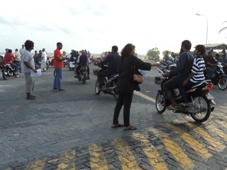A group of concerned citizens and members of civil society organisations launched a protest today in response to parliament’s Public Accounts Committee (PAC) decision last week to issue a lump sum of Rf140,000 (US$9,000) as committee allowance back pay for January through July this year.
If the PAC decision stands, in addition to a monthly salary of Rf62,500 (US$4,000), at the end of August each MP would receive a lump sum of Rf160,000 (US$10,386) as committee allowance.
At a time when the country faces a crippling budget deficit, the back payment of the allowance will cost the state up to Rf12.32 million (US$800,000), rising to Rf76.23 million (US$4.9 million) in wages for 77 MPs for the whole year.
Gathered near the tsunami memorial after 4:30pm today, the protesting citizens handed out flyers to passersby with a graph showing the steep rise of MPs’ remuneration from Rf4,500 (US$292) a month in 2004 to Rf82,500 (US$5,350) a month in 2011.
 “MPs do not need to be paid more money to do committee work!” reads the flyer. “It is the duty of MPs. It is one of the most important responsibilities that has to be carried out by MPs.”
“MPs do not need to be paid more money to do committee work!” reads the flyer. “It is the duty of MPs. It is one of the most important responsibilities that has to be carried out by MPs.”
As this was “clearly stated in Majlis’ law,” drawing an additional Rf20,000 from public coffers “is a gross injustice to the Maldivian people.”
Aiman Rasheed from Transparency Maldives told Minivan News that the protestors believed the decision to institute a committee allowance was symptomatic of “inherent problems in the entire system.”
“With such a high budget deficit and high inflation, we do not accept that the hike [in remuneration] is at all responsible,” he explained.
Aiman dismissed the argument that a committee allowance would improve parliament productivity: “The rules of Majlis committees, how they function, the relationship of the parties and procedures on proposing bills should be changed. Basically, they should become better people.”
For productivity to increase, said Aiman, parliament as an institution should function better.
Carrying a placard calling on her MP to not accept the allowance, Salma Fikry, executive board member of NGO Democracy House, said that the “pretext [of improving productivity] the MPs are using is utterly ridiculous.”
“The civil servants are in more close proximity to the public, so what about the productivity of civil servants?” she asked.
Salma argued that as committee meetings were “part of MPs’ duties,” the decision to issue Rf20,000 as committee allowances “is an injustice done to the Maldivian people.”
Aiman meanwhile asserted that the decision to issue a lump sum for seven months cast doubts on MPs “sincerity” as each MP would receive the back pay regardless of attendance.
Moreover, Aiman pointed out that parliamentary committees did not function for two months of the current session over a partisan dispute regarding the revision of committee composition.
“These things need to be talked about,” he said. “What we are trying to do is bring this issue to the spotlight and help the public understand […] With a constitution based on parliamentary supremacy, nothing in the country can go right if the MPs aren’t responsible. We want to create grassroots demand about what is going in Majlis and for the public to be aware of it.”
 Salma however said she doubted if MPs would be moved by the protests to scrap the controversial allowances.
Salma however said she doubted if MPs would be moved by the protests to scrap the controversial allowances.
“Because in January this year we launched quite a strong campaign against the Parliamentary Privileges Act and we also spoke about the committee allowance during that campaign,” she explained. “But what we see today is that civic action is not bearing what it should in this democracy of ours.”
This was the case because state institutions such as the People’s Majlis were “too strong” and “has a lot of vested interest and a lot corruption,” she said.
Aiman concurred that MPs “do not bow to civic pressure” but the NGOs and concerned citizens hoped to “equip the public with relevant knowledge” to hold parliament accountable and achieve a reduction in “the almost exponential [year-on-year] growth” of salaries in the state budget.
“Thirdly, [we want] the public to understand these issues and demand accountability,” he said. “Fourth, we want to broaden the engagement of citizens with the People’s Majlis. And to let the People’s Majlis know that the people are watching you and that the people do care.”
